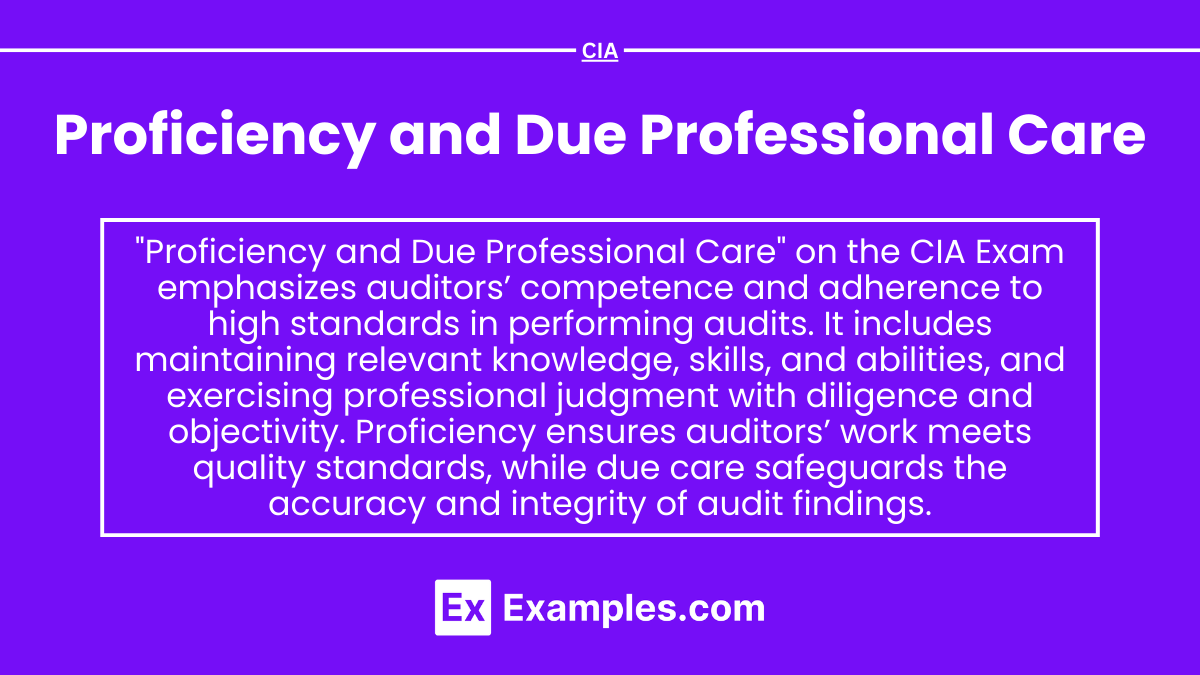Preparing for the CIA Exam requires a deep understanding of “Proficiency and Due Professional Care,” essential components of the Auditing standards. Mastery of these principles ensures that auditors can competently evaluate and manage risk, uphold ethical standards, and deliver reliable, professional results, which is crucial for success on the CIA Exam.
Learning Objective
In studying “Proficiency and Due Professional Care” for the CIA Exam, you should aim to understand the core principles that guide auditors in conducting their duties with competence and diligence. Learn to evaluate the standards for maintaining quality in auditing practices, including the need for continuous professional development and adherence to ethical guidelines. Analyze the requirements for conducting audits with due professional care, such as thorough planning, obtaining sufficient evidence, and maintaining an objective standpoint. Additionally, explore case studies and regulatory frameworks that illustrate the application of these principles in real-world scenarios to enhance your ability to apply this knowledge effectively in the CIA Exam.
Understanding Proficiency and Due Professional Care
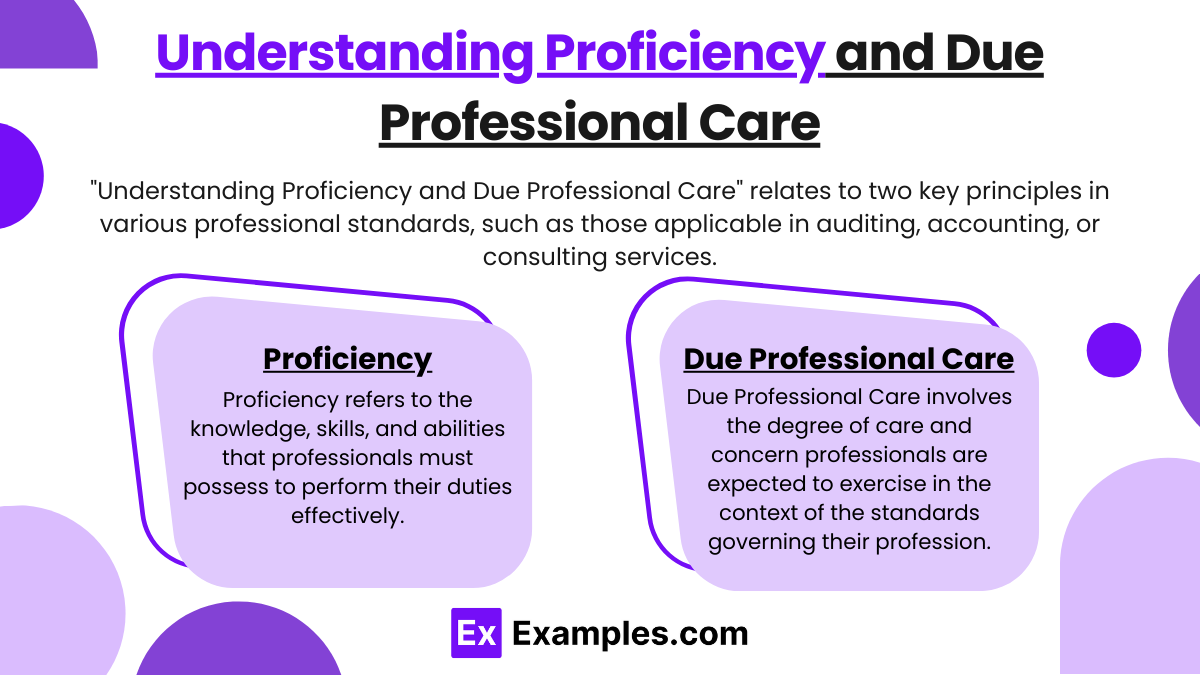
“Understanding Proficiency and Due Professional Care” relates to two key principles in various professional standards, such as those applicable in auditing, accounting, or consulting services. Here’s a breakdown of both concepts:
Proficiency
Proficiency refers to the knowledge, skills, and abilities that professionals must possess to perform their duties effectively. This includes:
- Education and Training: Adequate formal education in the relevant field and ongoing training to keep up with developments.
- Professional Certification: Holding necessary licenses or certifications as required by the profession or industry.
- Experience: Practical experience that enhances technical competence and judgment.
Professionals are expected to maintain their proficiency over time, adapting to changes in laws, standards, technology, and market conditions.
Due Professional Care
Due Professional Care involves the degree of care and concern professionals are expected to exercise in the context of the standards governing their profession. It includes:
- Thoroughness: Ensuring completeness and accuracy in professional duties.
- Skepticism: Maintaining a questioning mind and a critical assessment of evidence.
- Risk Management: Identifying and addressing potential risks associated with professional tasks and decisions.
Due professional care helps safeguard the quality of professional work, ensuring that services meet both client expectations and the requirements of regulatory bodies.
Standards for Maintaining Quality
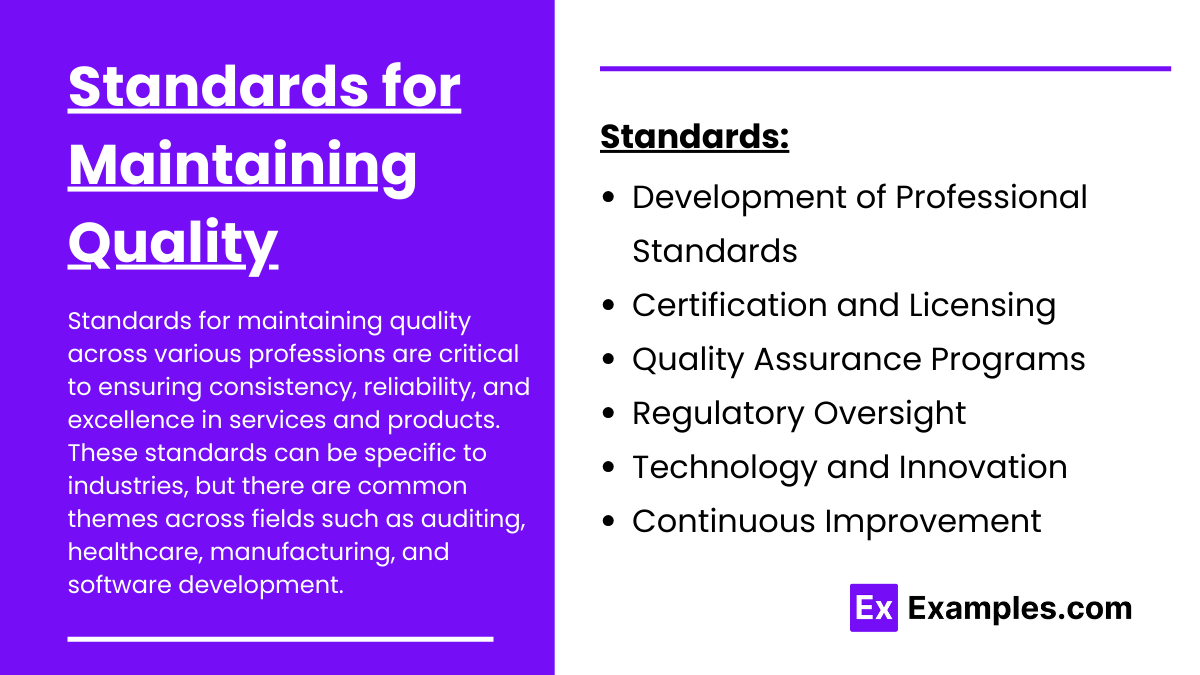
Standards for maintaining quality across various professions are critical to ensuring consistency, reliability, and excellence in services and products. These standards can be specific to industries, but there are common themes across fields such as auditing, healthcare, manufacturing, and software development. Here’s a breakdown of how quality standards are typically maintained and enforced:
1. Development of Professional Standards
Quality begins with clearly defined professional standards that outline the expected performance and outcomes. These include:
- Technical Standards: Specific guidelines for practices and procedures, like the Generally Accepted Accounting Principles (GAAP) or International Financial Reporting Standards (IFRS) in accounting.
- Ethical Standards: Guidelines to ensure behavior and decisions adhere to ethical principles, such as confidentiality and fairness.
2. Certification and Licensing
Professionals may need to obtain certifications or licenses to practice, ensuring they meet the minimum standards of proficiency and knowledge:
- Examinations: Rigorous testing of knowledge and skills before granting a certification.
- Continuing Education: Requirements to update skills and knowledge through courses and training periodically.
3. Quality Assurance Programs
Organizations often implement internal quality assurance systems to monitor and improve the quality of their output:
- Audits and Reviews: Regular evaluations of work by independent parties to ensure adherence to standards.
- Feedback Mechanisms: Systems to collect feedback from clients or end-users to continually adjust and improve services.
4. Regulatory Oversight
External bodies often regulate professions to ensure public trust and compliance with laws:
- Regulatory Agencies: Bodies like the Financial Accounting Standards Board (FASB) or the Food and Drug Administration (FDA) set and enforce standards.
- Legal Requirements: Laws and regulations that dictate certain standards and practices in specific fields.
5. Technology and Innovation
Leveraging technology to enhance quality control and assurance:
- Automated Systems: Use of software and technology to ensure precision and reduce human error.
- Innovative Practices: Adopting new methods and technologies to improve quality and efficiency.
6. Continuous Improvement
A commitment to continuous improvement is vital for maintaining high standards:
- Six Sigma and Lean Methodologies: These and other methodologies focus on reducing waste and improving efficiency.
- Quality Circles: Small groups of employees who regularly meet to brainstorm solutions to problems.
Requirements for Due Professional Care
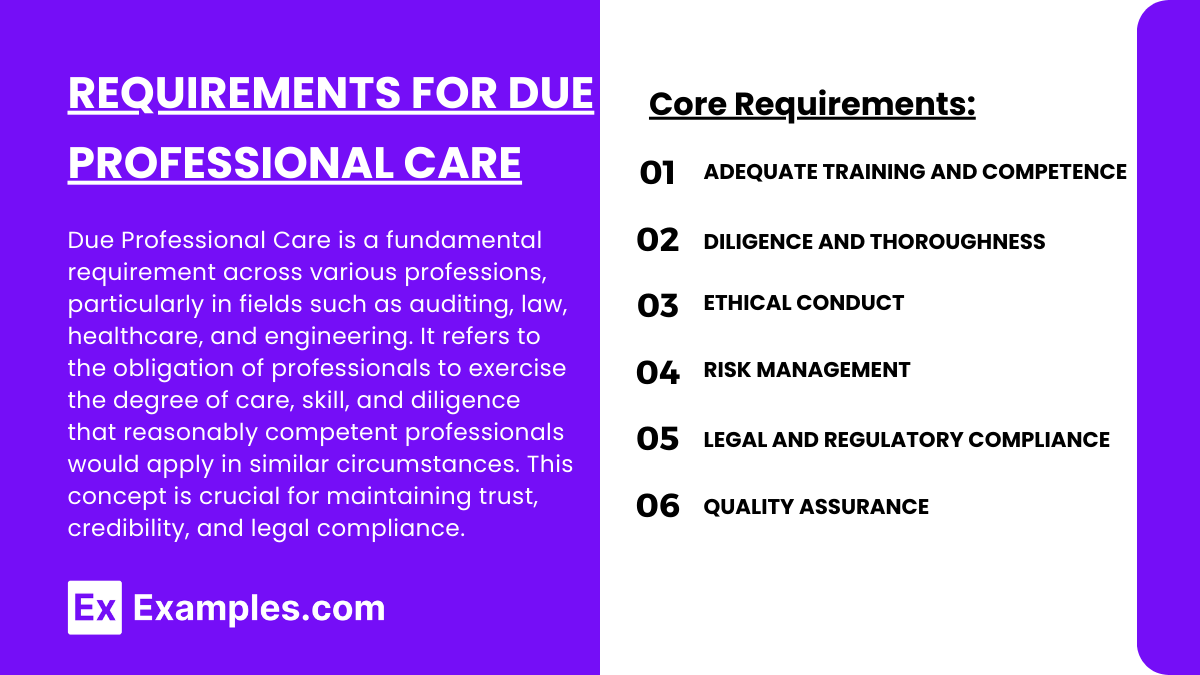
Due Professional Care is a fundamental requirement across various professions, particularly in fields such as auditing, law, healthcare, and engineering. It refers to the obligation of professionals to exercise the degree of care, skill, and diligence that reasonably competent professionals would apply in similar circumstances. This concept is crucial for maintaining trust, credibility, and legal compliance. Here are the core requirements and considerations for ensuring due professional care:
- Adequate Training and Competence: Professionals must have appropriate education, ongoing training, and up-to-date certifications.
- Diligence and Thoroughness: Work should be performed diligently and thoroughly, with proper documentation and attention to detail.
- Ethical Conduct: Professionals must adhere to ethical standards, ensuring honesty, confidentiality, and objectivity in their work.
- Risk Management: Identify and manage potential risks through assessment, control implementation, and continuous monitoring.
- Legal and Regulatory Compliance: Stay informed and comply with all relevant laws, regulations, and professional standards.
- Quality Assurance: Maintain quality through peer reviews, client feedback, and internal audits.
Real-World Application and Case Studies
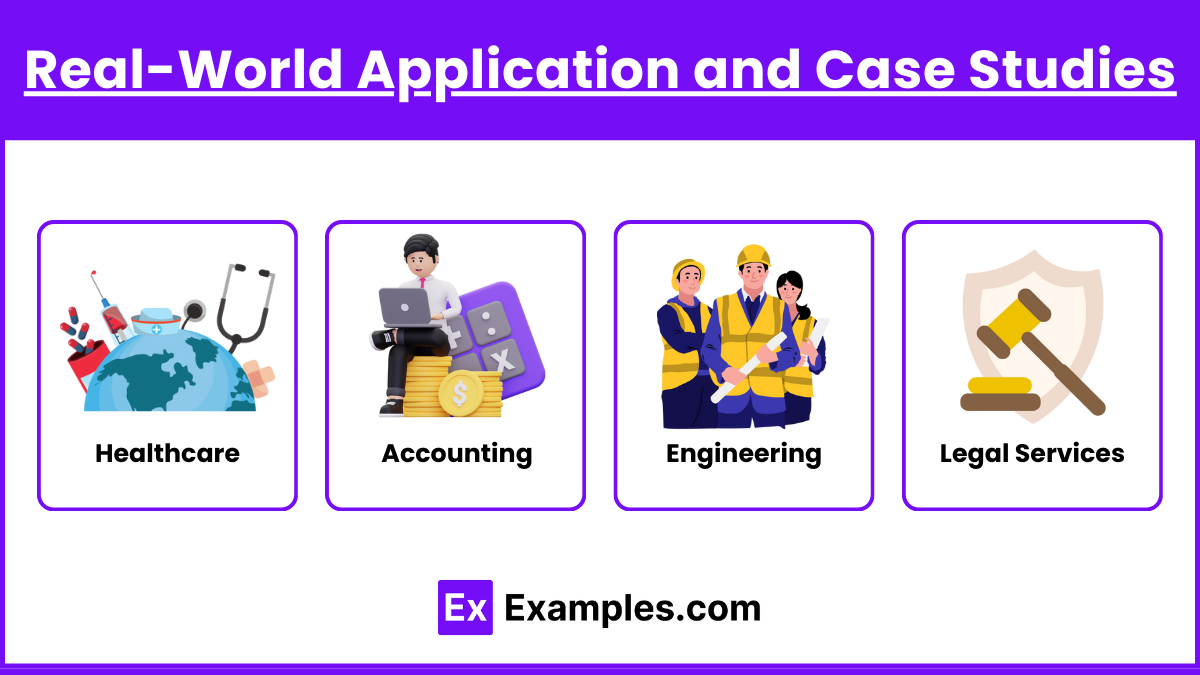
Applying the concept of due professional care in real-world situations involves various scenarios across different professions. Here are a few case studies illustrating how this principle is upheld in practice:
Case Study 1: Healthcare
A hospital managing a viral infection outbreak.
Application: Medical staff adhere to infection control protocols, use medical knowledge diligently, and implement regular audits to ensure high-quality care.
Outcome: Effective control of infection rates and improved patient outcomes.
Case Study 2: Accounting
Financial reporting for a publicly traded company.
Application: Accountants follow strict financial standards (GAAP/IFRS), perform detailed audits, and uphold ethical standards like confidentiality and objectivity.
Outcome: Reliable financial statements that boost investor trust and ensure regulatory compliance.
Case Study 3: Engineering
Design and construction of a new bridge.
Application: Engineers ensure safety and quality through rigorous design validation, materials testing, and adherence to legal construction codes.
Outcome: A safely constructed bridge that meets all performance and regulatory standards.
Case Study 4: Legal Services
Representation in corporate litigation.
Application: Lawyers conduct comprehensive case research, maintain ethical standards, and ensure meticulous presentation of evidence.
Outcome: Fair legal proceedings and preservation of the law firm’s integrity and client trust.
Examples
Example 1: Healthcare – Emergency Response
- Scenario: A rapid response team effectively manages a sudden cardiac arrest situation in a hospital.
- Due Professional Care: Quick and accurate diagnosis, timely CPR, and appropriate medical intervention demonstrate high standards of patient care and crisis management.
Example 2: Accounting – Audit Process
- Scenario: An auditor detects financial discrepancies in a company’s books during a routine audit.
- Due Professional Care: The auditor meticulously verifies all entries, adheres to auditing standards, and reports findings transparently, ensuring financial integrity and compliance.
Example 3: Engineering – Safety Inspections
- Scenario: An engineer conducts a pre-launch safety inspection of a new roller coaster.
- Due Professional Care: Thorough inspection of mechanical systems and adherence to safety regulations ensure that the ride is safe for the public.
Example 4: Legal – Trial Preparation
- Scenario: A defense attorney prepares for a high-stakes criminal trial.
- Due Professional Care: Comprehensive evidence review, witness preparation, and strategic legal planning uphold the defendant’s right to a fair trial and competent representation.
Example 5: Information Technology – Data Security
- Scenario: An IT professional implements enhanced security measures to protect sensitive client data against cyber threats.
- Due Professional Care: Deployment of advanced encryption, regular security audits, and adherence to data protection laws demonstrate diligence and responsibility in managing client data.
Practice Questions
Question 1: Information Technology Security
What is the primary purpose of using a firewall in network security?
- A. To enhance internet speed
- B. To monitor data usage
- C. To prevent unauthorized access
- D. To increase data storage capacity
Answer: C. To prevent unauthorized access
Explanation: A firewall is a network security system that monitors and controls incoming and outgoing network traffic based on predetermined security rules. Its primary purpose is to establish a barrier between a trusted internal network and untrusted external networks, such as the internet, thereby preventing unauthorized access to or from the network.
Question 2: Financial Reporting
Which accounting principle requires that expenses be matched with revenues in the period in which they are incurred to produce those revenues?
- A. Historical Cost Principle
- B. Revenue Recognition Principle
- C. Matching Principle
- D. Full Disclosure Principle
Answer: C. Matching Principle
Explanation: The Matching Principle is a fundamental concept in accrual accounting. It dictates that expenses should be recorded in the same accounting period as the revenues they helped to generate. This principle ensures that financial statements provide a complete and accurate picture of a company’s financial performance during a specific period.
Question 3: Clinical Ethics
In medical practice, informed consent is most important for ensuring which of the following?
- A. Cost-effectiveness of treatment
- B. Patient autonomy
- C. Hospital revenue
- D. Treatment efficacy
Answer: B. Patient autonomy
Explanation: Informed consent is a process through which a patient learns about and understands the purpose, benefits, and potential risks of a medical or surgical intervention and then agrees to receive the treatment. It is crucial for respecting and promoting patient autonomy, as it ensures that patients are making well-informed decisions about their own healthcare.

